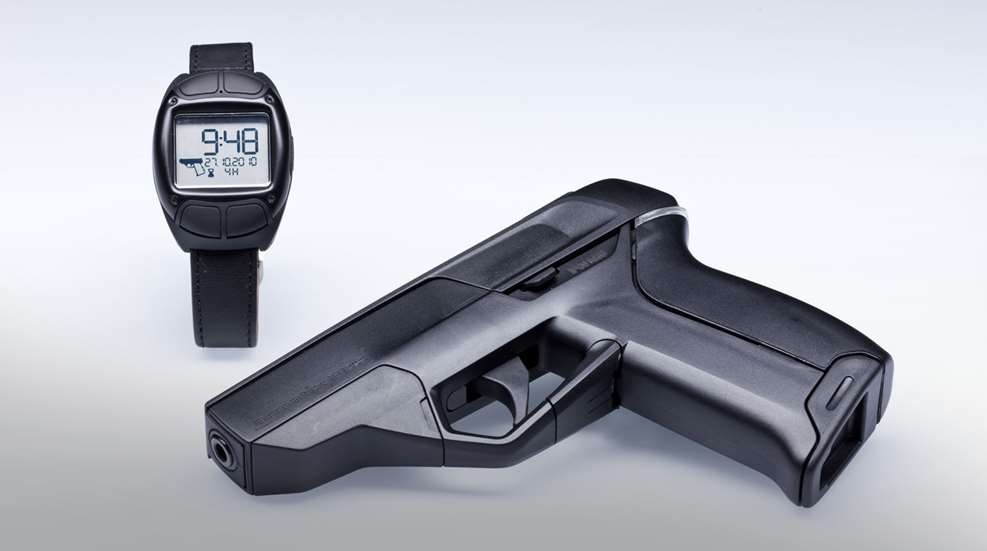In the field of computer science, there exists a longstanding rule of thumb known as “Moore’s Law,” which dictates that the number of transistors available on an integrated circuit will roughly double every two years. In simpler terms, computer chips will become exponentially more complex over time. Indeed, since Gordon Moore last revised his eponymous rule in 1975, semiconductor technology has advanced at a breakneck pace, allowing engineers to give all sorts of devices their own onboard control chips. Your car’s engine has a microprocessor in it. So do your refrigerator, your washer and dryer, and even the toilets at your nearest gas station. If so many devices in our modern world are computerized, though, then why not firearms?
One reason has to do with the legal landscape. The discussion of “smart guns” in the United States largely revolves around the New Jersey Childproof Handgun Law, passed in 2002. It has been repealed and partially replaced now, but in its original form, it placed a ban on the sale of conventional handguns to take effect after the introduction of so-called “personalized handguns” to the consumer market. The law defined these as handguns which were designed and manufactured in such a way that they could only be fired by an authorized user. Again, once these were available for sale, they would become the only handguns legally obtainable in the state. The established firearm manufacturers already had little or no reason to develop “smart guns,” and this law further dissuaded them from doing so for fear of triggering its blanket ban.
Laws aside, there are a variety of challenging engineering problems inherent to “smart guns.” Anyone who uses firearms in a serious capacity has very high standards for reliability and ruggedness. Existing conventional firearms can be submerged in water, dropped repeatedly on hard surfaces, neglected for decades, and still be expected to function flawlessly. 99.9% reliability means one failure in 1,000 rounds, an unacceptably poor level of performance. Although some microprocessors are rated for extreme conditions, repeated thermal cycling (heating and cooling) combined with tens of thousands of intense physical shocks from recoil would gradually damage solder joints, a common point of failure for complex electronics. Furthermore, past “smart gun” designs typically rely on biometric data from a fingerprint sensor or near-field communication from an RFID tag in a special wristband. Both technologies are less reliable and potentially slower than the mechanical safety mechanisms to which we’re all already accustomed. Finally, the high costs associated with the development and manufacture of any electronic firearm would inevitably be passed on to the consumer, effectively pricing a large number of people out of the market entirely.
Even if the engineering problems can be solved, it isn’t clear that any substantial demand exists for “smart guns.” The idea of physically preventing unauthorized access to a firearm is the basis for many of the safety measures we already take as responsible gun owners, and as a result, the number of accidents a “smart gun” could prevent is vanishingly small. Proponents of the concept also suggest that biometric and RFID locks could prevent criminal misuse of stolen firearms, but those security measures are relatively easy to circumvent and do nothing about the huge number of illegal firearms already in circulation.
The consumer market neither needs nor wants “smart guns” because, apart from a small and questionable measure of physical security, they offer no inherent benefits over their conventional counterparts. It seems like better enforcement of existing laws would be a far simpler and more efficient solution than totally redesigning every handgun currently in production. The “smart gun” is mostly a theoretical concept used by hilariously misinformed laypeople and bad-faith negotiators to justify bans on conventional (real) firearms. The good news for us is that we don’t have to worry about more “smart gun” mandates—yet. The New Jersey Childproof Handgun Law was superseded a few years ago and no similar bills have made significant progress elsewhere. That being said, misguided tech startups keep cramming computers in places they don’t belong, so it’s possible or even likely that we’ll have to deal with a “smart gun” mandate bill in the near future. Be prepared.





Comments